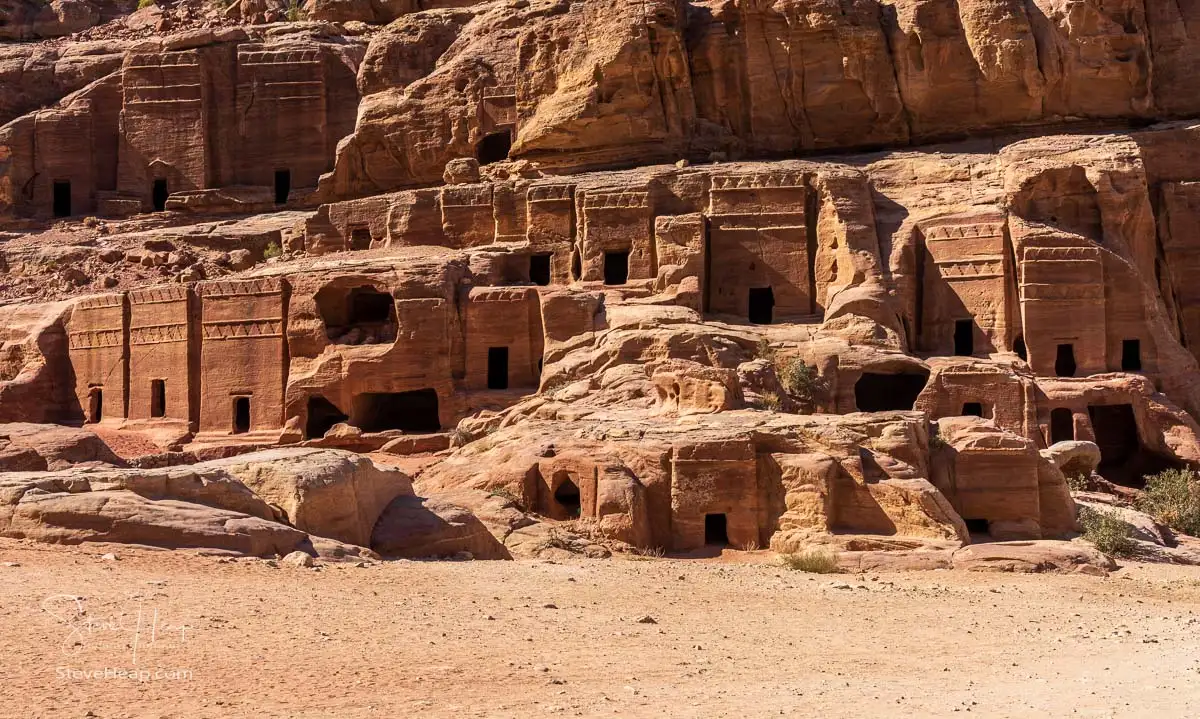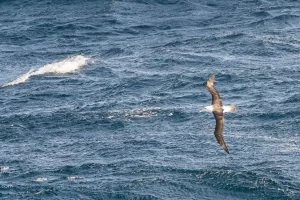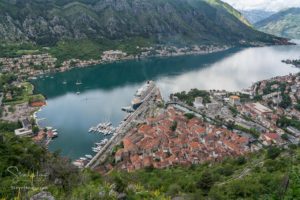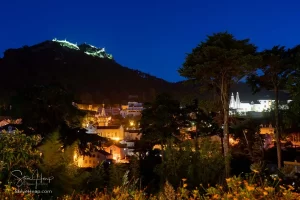Continuing our day by day extended review of the Jordan extension to the Viking Pharaohs and Pyramids Nile cruise, we have reached the highlight of our days in Jordan – Petra. We had arrived the evening before at the Movenpick hotel right by the entrance to the Petra site and had another nice buffet dinner and breakfast at the hotel to fortify us before the adventure ahead. It is going to be warm/hot and you are going to need plenty of water along the way, so don’t forget that. The map at the entrance to the site gives you an idea of what to expect:
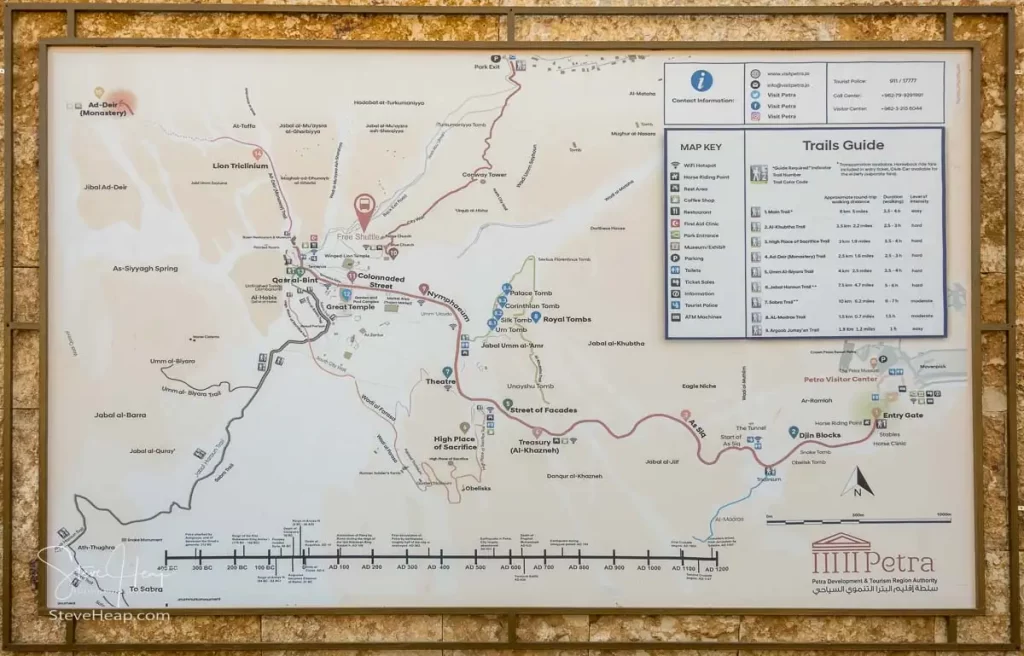
The small scale in the bottom right is of one kilometer (0.6 mile) and we are going to walk from the middle right at the entrance all the way to the where the colonnaded street ends. Then although it shows a Shuttle just above there, it actually turned out to be about a mile up the road going toward the exit in the top center. And, of course, there is the optional extra of a hike up the train to The Monastery in the very top left corner (and back, and to the shuttle). I think I walked almost 10 miles that day and there were 800 steps on the trail to the Monastery. So be prepared with good hiking shoes and as much energy as you can muster. Tomorrow, you can rest (sort of!)
The walk to Petra itself is long but relatively smooth and downhill. Our group got regular breaks in the shade as our guide explained something with drawings in the sand!
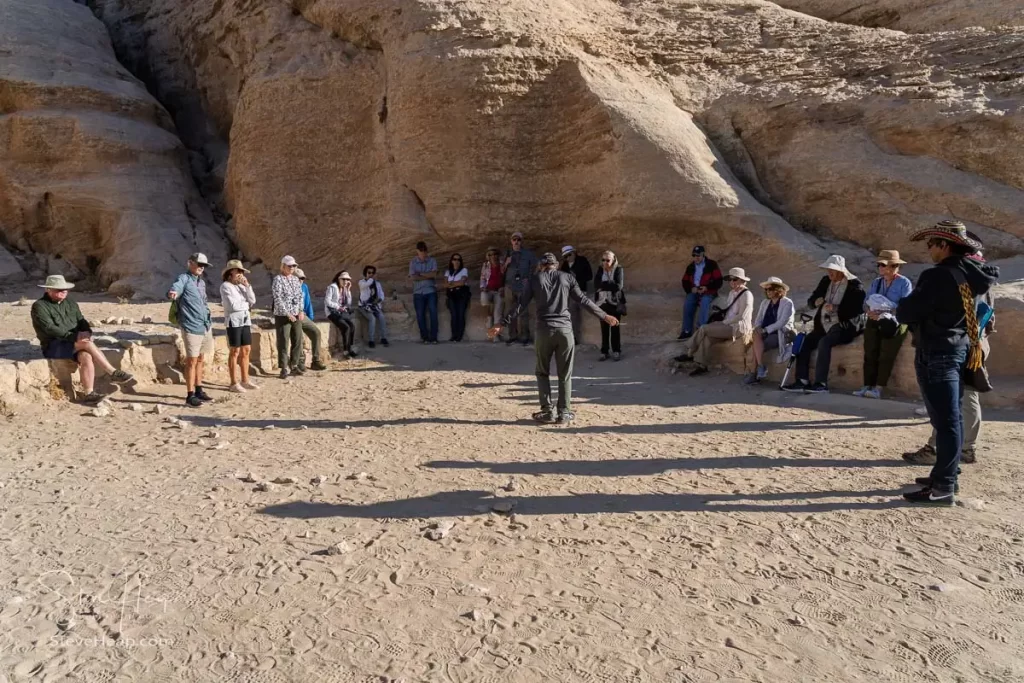
And, even in this first open section there are tombs carved out of the rocks as we make our way towards the Siq, the main canyon to Petra. There is a section of the road for horses and donkeys, so even in this section you can take a ride if you want. Very few did so at this stage of the day, though.
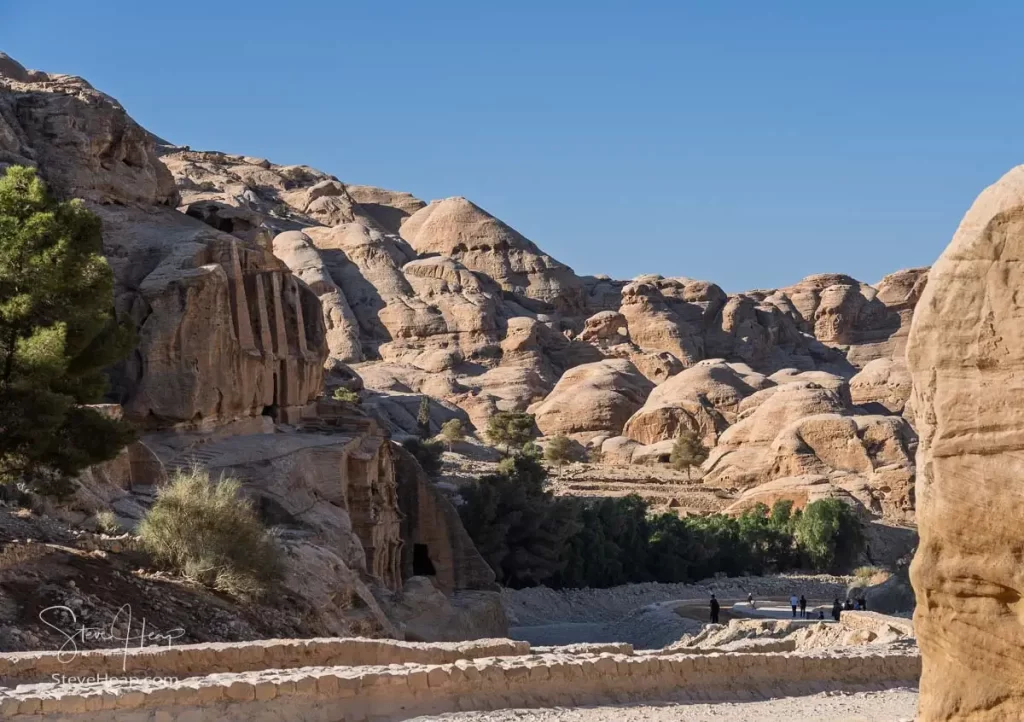
The entrance to the Siq is heavily guarded, or at least it would have been. This long canyon was formed by water eroding the rocks prior to the Nabataeans building their capital here. Petra was on the main camel routes through the middle east, and it is thought was an important stopping point for water and trading and tolls were paid to continue along the route towards the far east. The tombs that were not built, but actually carved from the rock itself were an important memorial for their important people, but also a very impressive sign of wealth and power for the traders passing through.
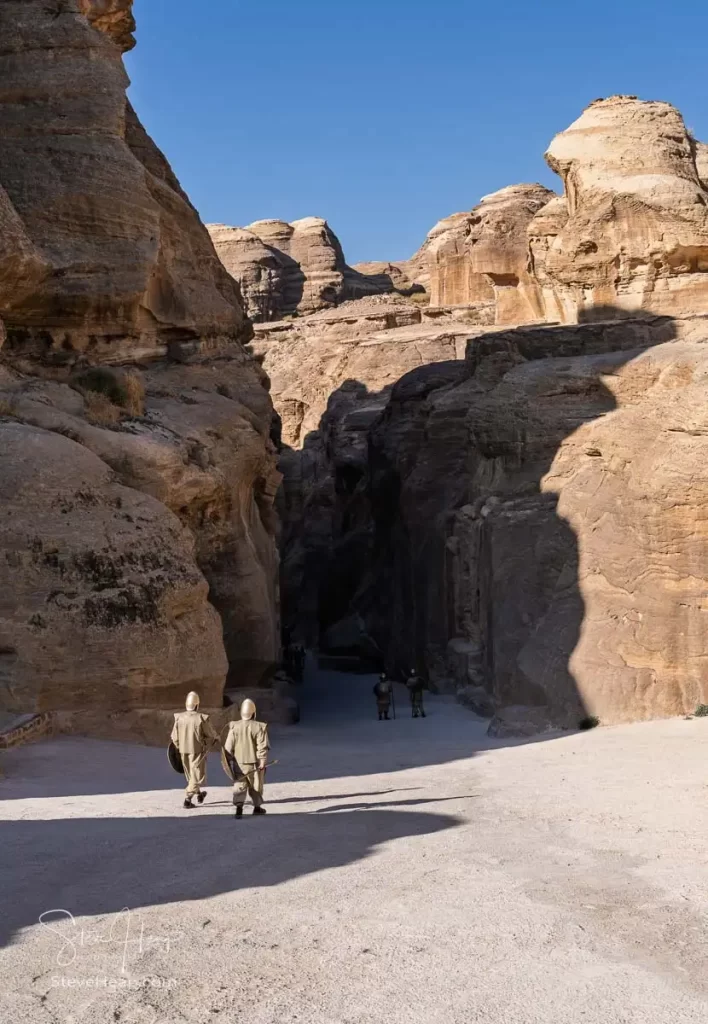
The Siq is that narrow gorge, very much like slot canyons in the deserts of the USA and very reminiscent of those. The walls can be up to 180m high (600 feet) and as narrow as 10 feet in places.
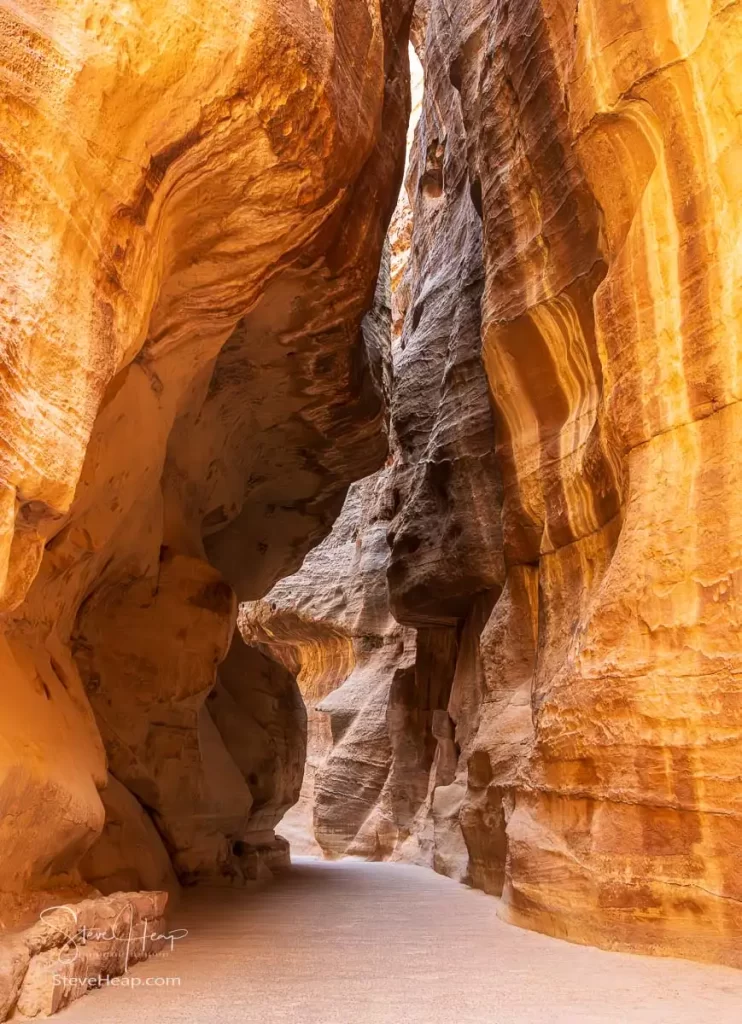
Wherever you look the rock faces are jagged and dramatic and you can imagine bringing your train of camels down this narrow track to the city.
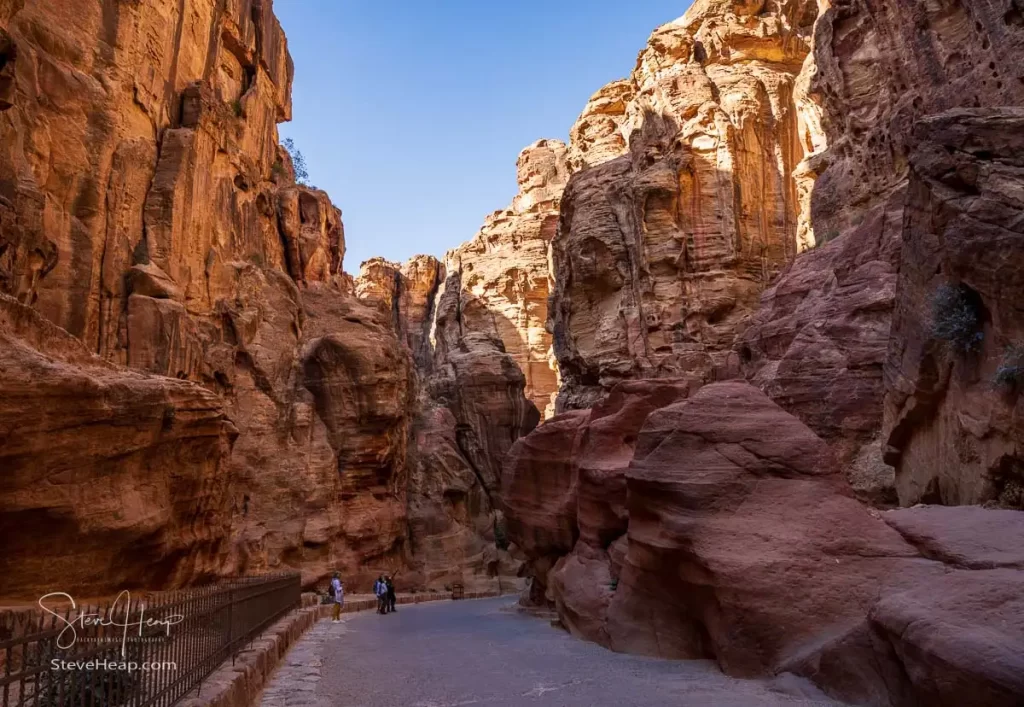
And, as you can see, it was not tremendously busy – much like everywhere in Jordan, tourism has taken a real hit with the troubles in Israel. After seemingly an endless walk, our guide did a clever trick to draw our attention to something behind us and then had us turn back to the track to see this:
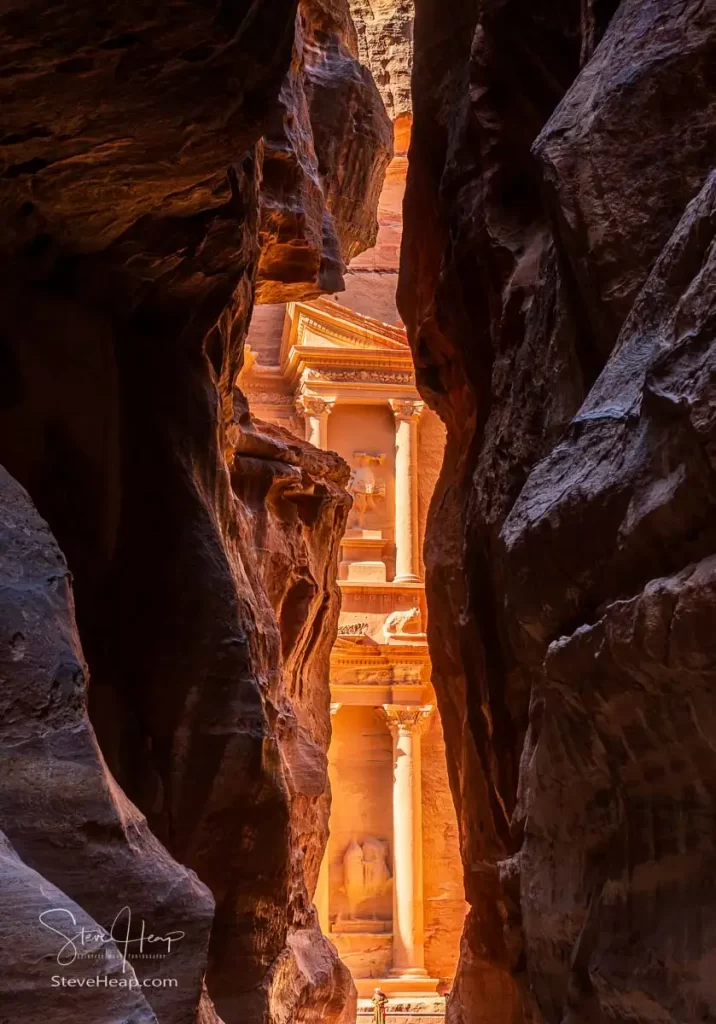
The “money shot” of Petra with the bright sunlit facade of the Treasury contrasting with the dark sinuous curves of the Siq gorge.
Or, if you prefer the artistic rendition in Black and White:
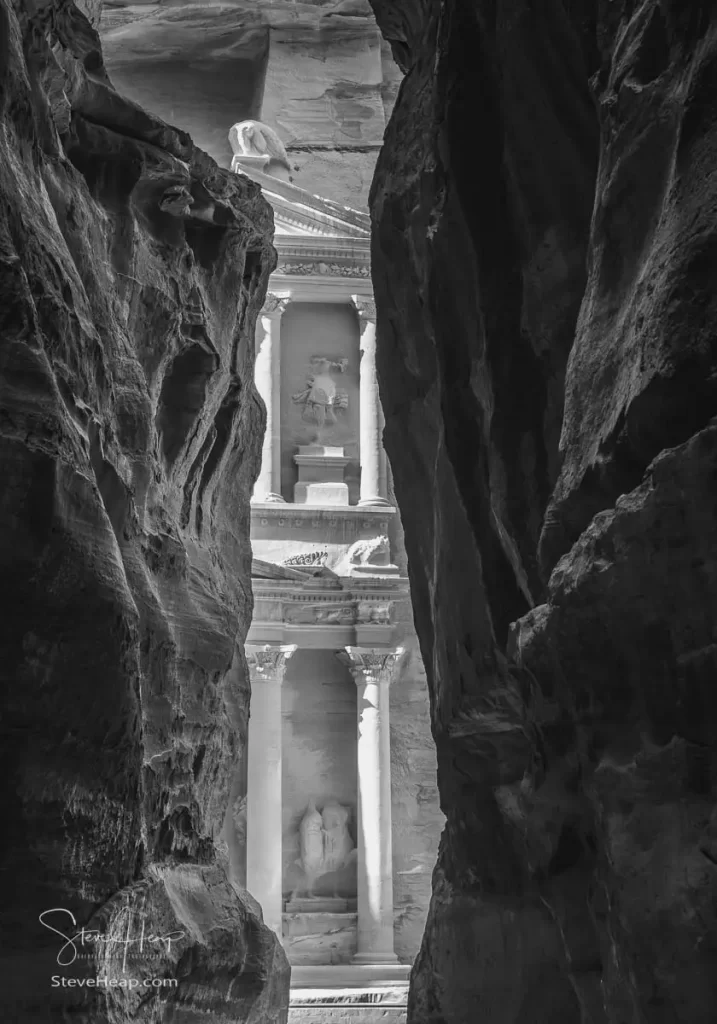
There were more people milling around the Treasury (and there is a small stall selling refreshments and some toilets) but it wasn’t too difficult to capture this camel happy to have his portrait taken with the carved Treasury behind.
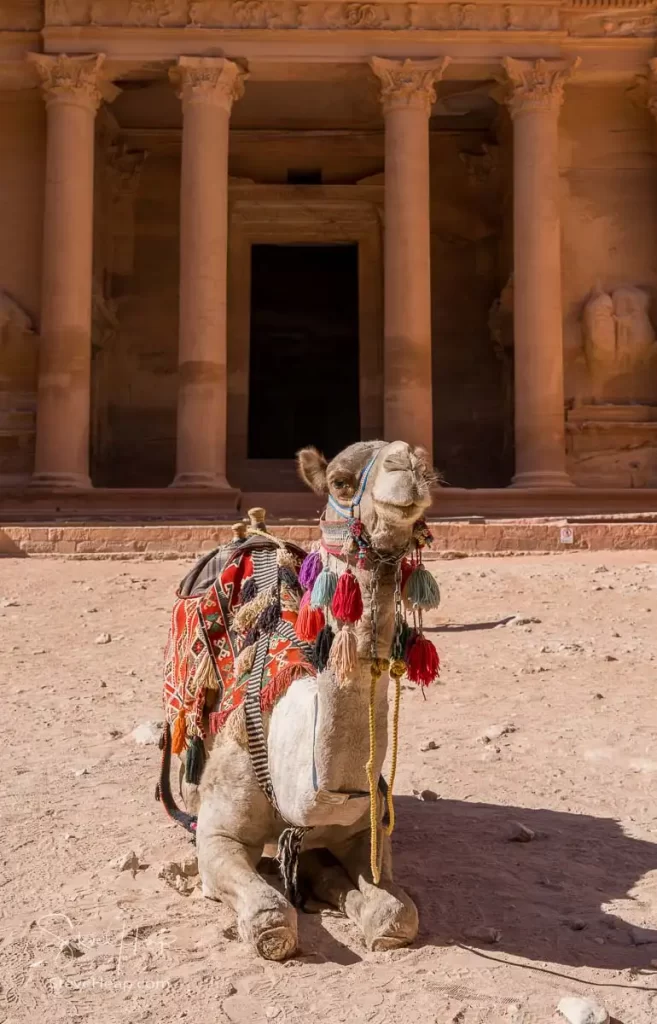
I’m often amazed at how this could have been achieved with the tools available two thousand years ago?
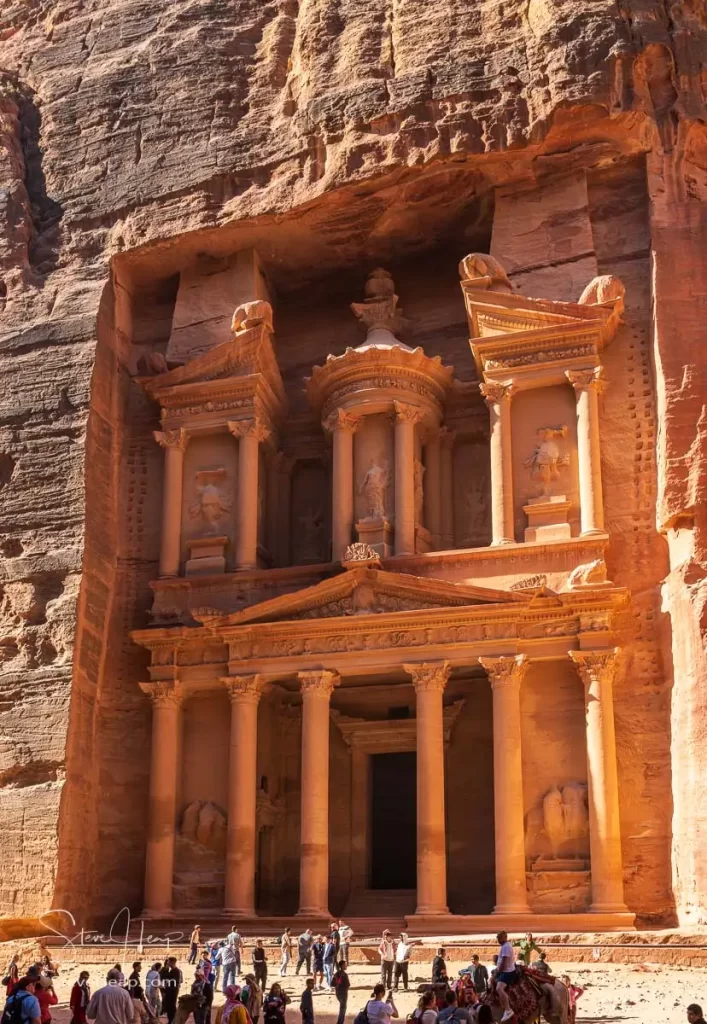
You can see, in this photo, the original surface of the rock face and then how deep they carved to create the columns, mouldings and then the doorway deeper into the rock face to create the rooms inside. Amazing work, and this was just one of many tombs and buildings as we continued down the Street of Facades.
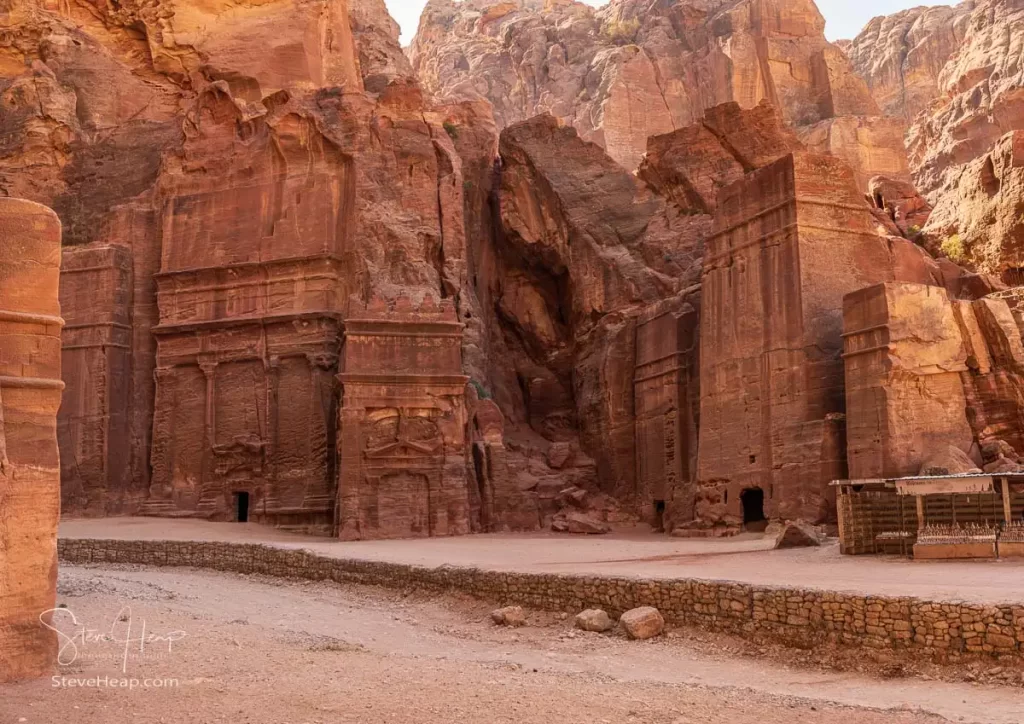
We did stop for a breather in that little shack selling sand pictures in bottles to see how the owner actually made them. Talk about patience and delicate work!
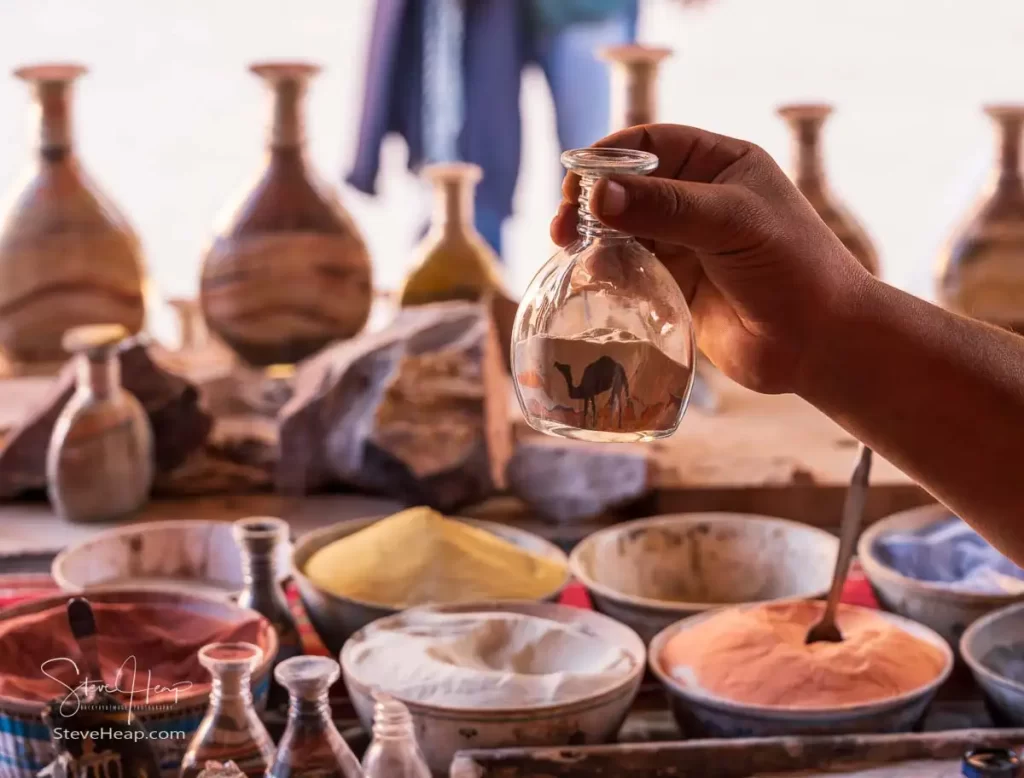
As you walk further down the road, you start to see the Tombs of the Kings that are built into the rock face on the right side of the valley.
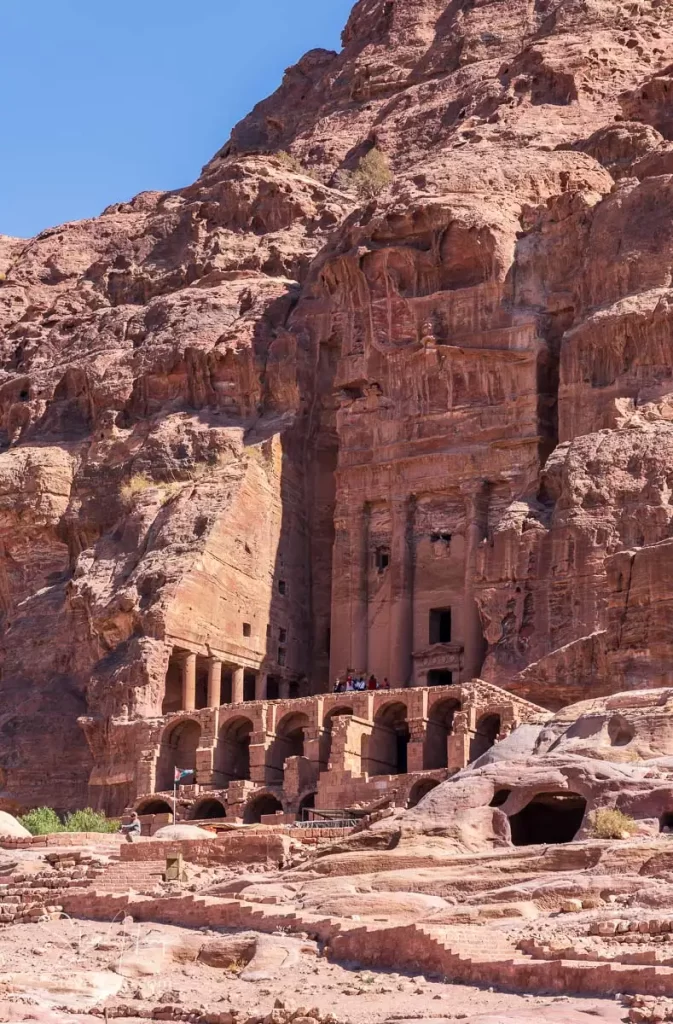
I thought this one in particular, the Urm tomb, shows just how deeply into the rock face these tombs were carved. The left side of the opening shows the tremendous depth of the excavation. As you can see, people are up exploring these tombs – it wasn’t on our agenda, but it would have been possible after the guided tour was complete.
We did have a break in a spice and souvenir stall around this time to sit and just relax with our water and any snacks we had brought with us. I think they did sell ice creams!
And still more to see! The Great Temple, or more likely the Royal Reception Hall was next, with its floor of hexagonal stones still largely intact and then finally this built, rather than carved Qasr al-Bint Far’un or Castle of the Pharaoh’s Daughter:
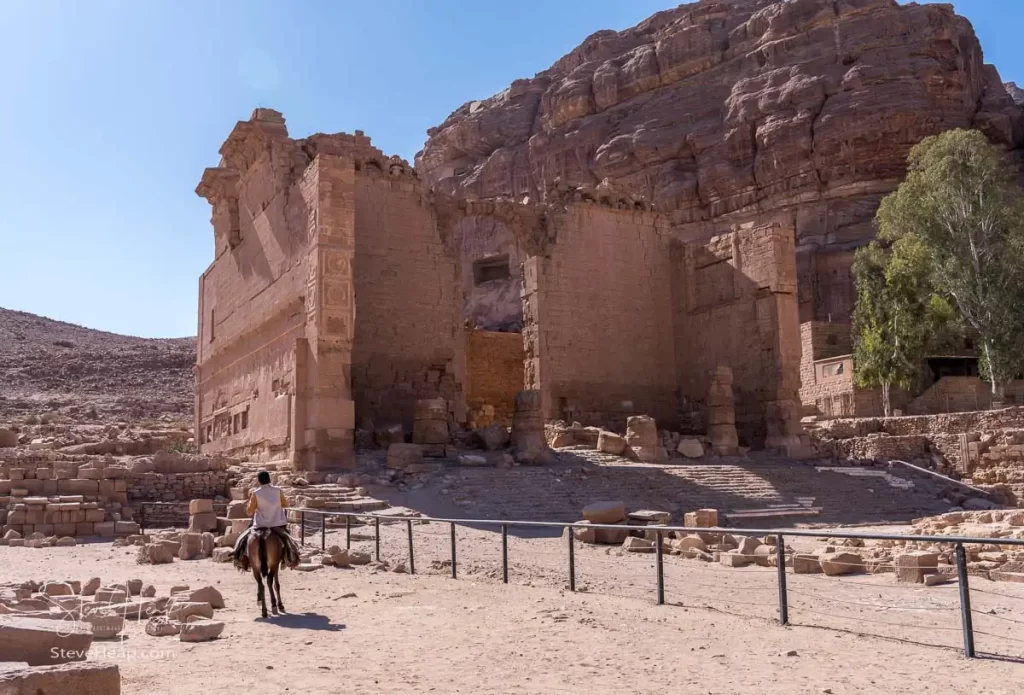
This one looks less than sturdy, especially around that archway in the center, but it must have been an impressive building back in the days of the Nabataean capital.
At this point, you do get a choice. You can walk (or ride a donkey) to the shuttle back to the hotel. There is a bar/restaurant for drinks and a small meal, you can explore the Royal Tombs, you can walk back the way we came to the hotel, or you can try one of the trails. Of course, I chose the latter and decided, along with perhaps a third of our group, to take the trail to Ad Deir or the Monastery which is 1.6km long and just 800 steps to the summit. There was a bit of a line for the toilets and so I decided to set out at a fast pace to try to beat the crowds!
The trail starts from behind the restaurant and is somewhat flat at the start. Even some nice reuse of one of the carved caves for a garage:
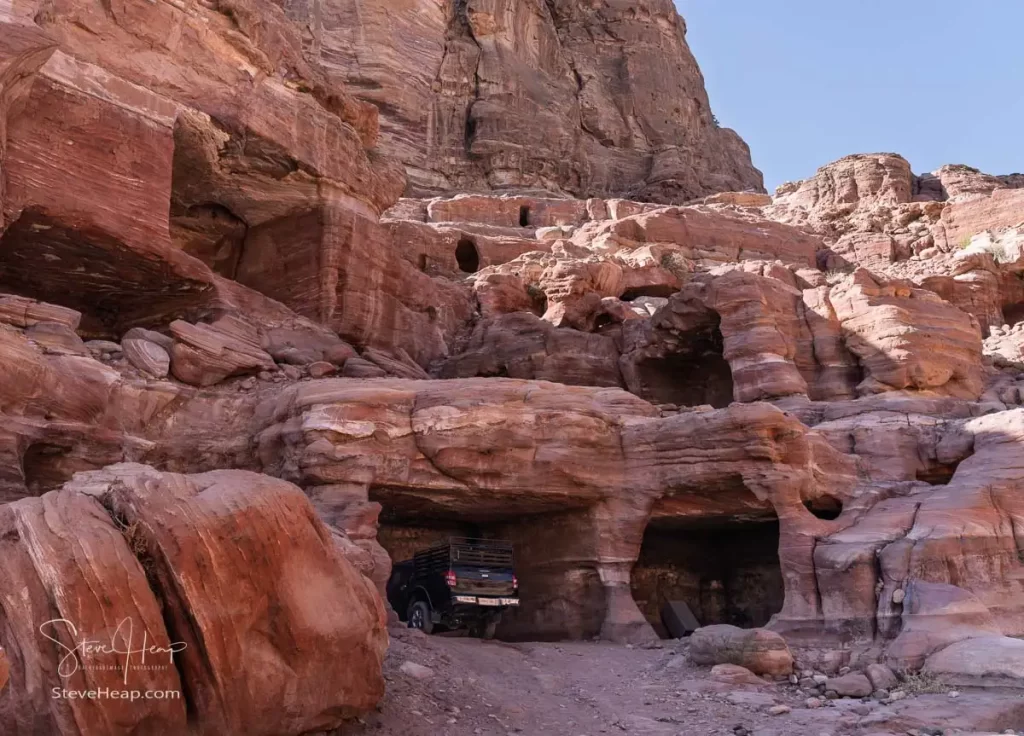
But pretty soon, the steps began. They are mainly carved out of the rock face and are not too steep (although a bit worn with constant footsteps) and I didn’t find the rock surface to be slippery with my hiking shoes. Some sections have stairs built using blocks:
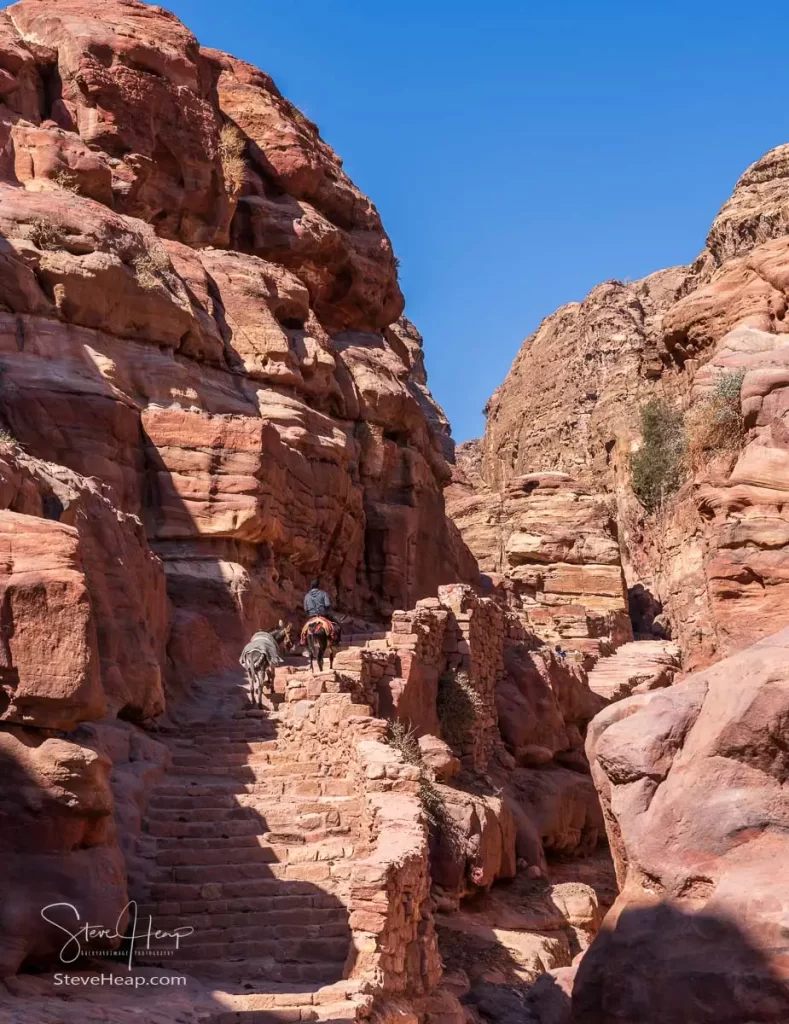
Some of the donkeys are so used to this trail that you see them either going up, or in this case, coming down on their own past one of the small stalls that are used by the Bedouins to sell mainly clothing and rugs.
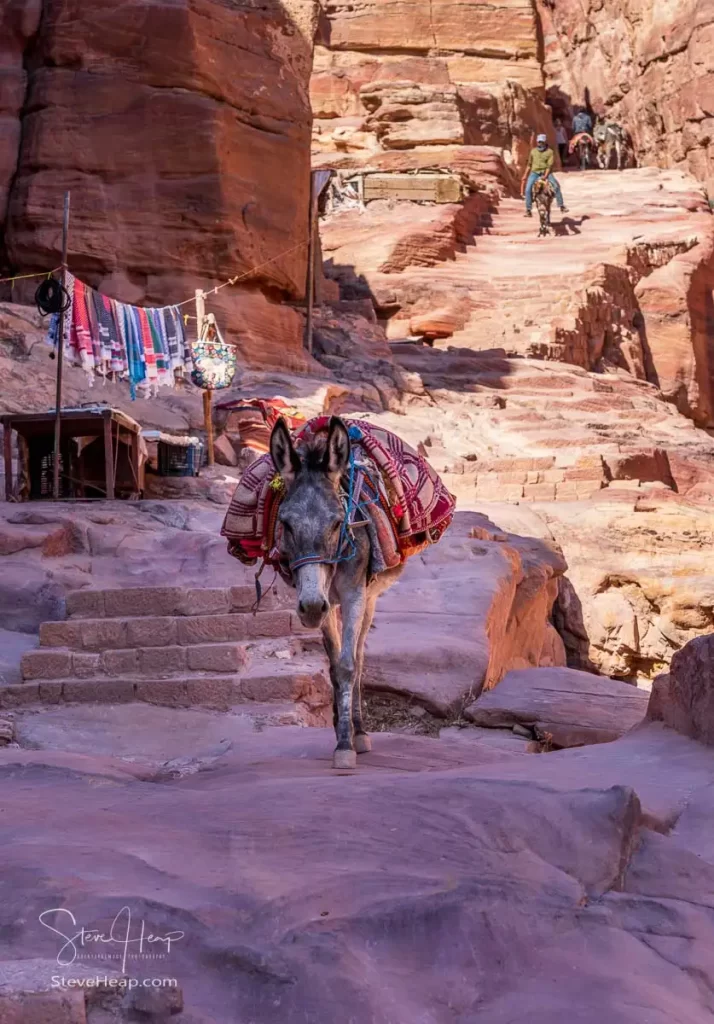
The trail does seem to go on and on at it curves through the ravines on the mountainside. The shops do keep appearing as you round the next bend, but unlike in Egypt, the shopkeepers are very polite.
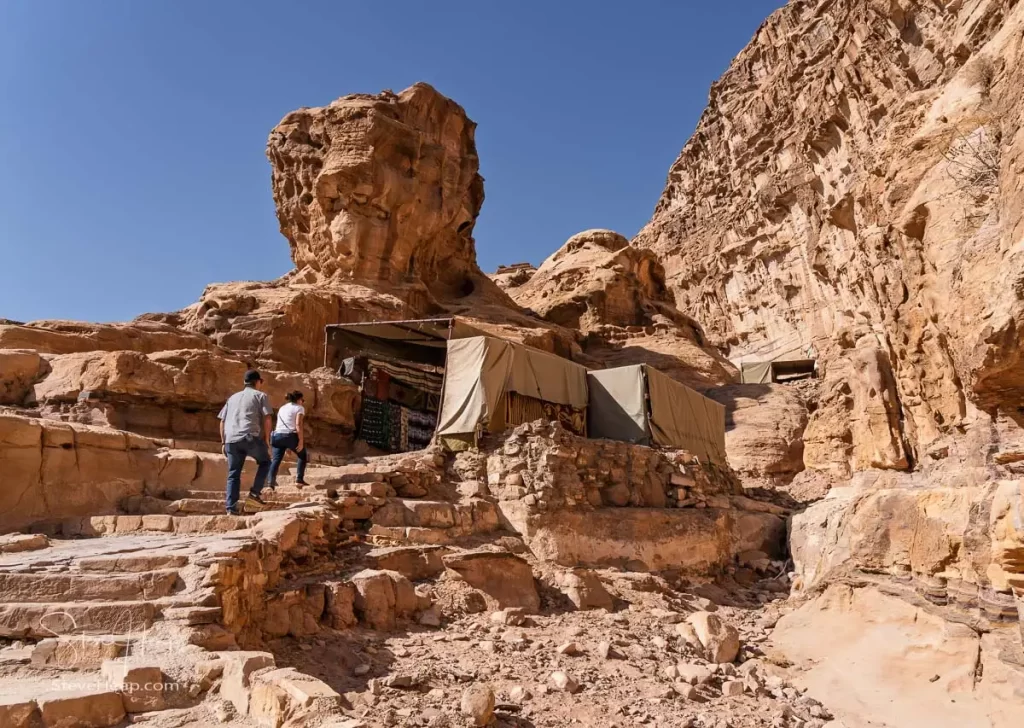
But finally, you crest the final set of steps to see the flat plateau on the mountain top. You might think this is not very exciting, but the main sight is actually around the corner to your right:
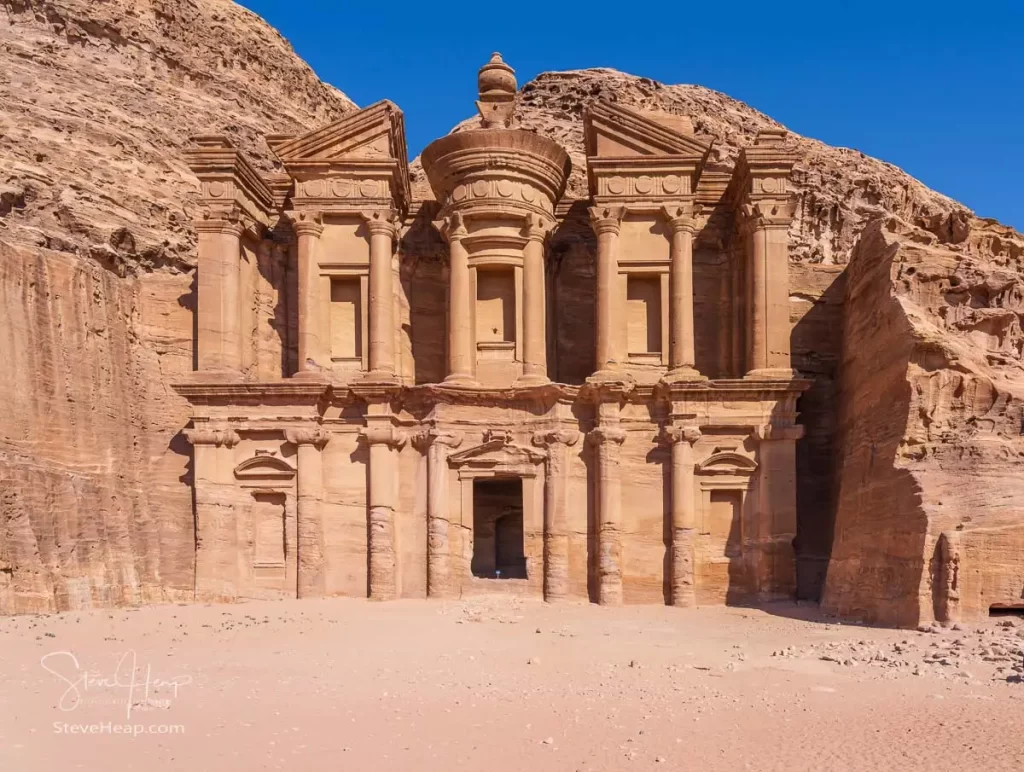
Somewhat similar to the Treasury, but not as ornate, this was not likely to have been a Monastery – more likely a place for ritual banquets to celebrate the royalty in Petra. I can’t imagine walking down all those steps after a boozy dinner up on the mountaintop!
The plateau itself is worth exploring. You will see many sign for the best view in the world, and you can pick the one that takes your fancy.
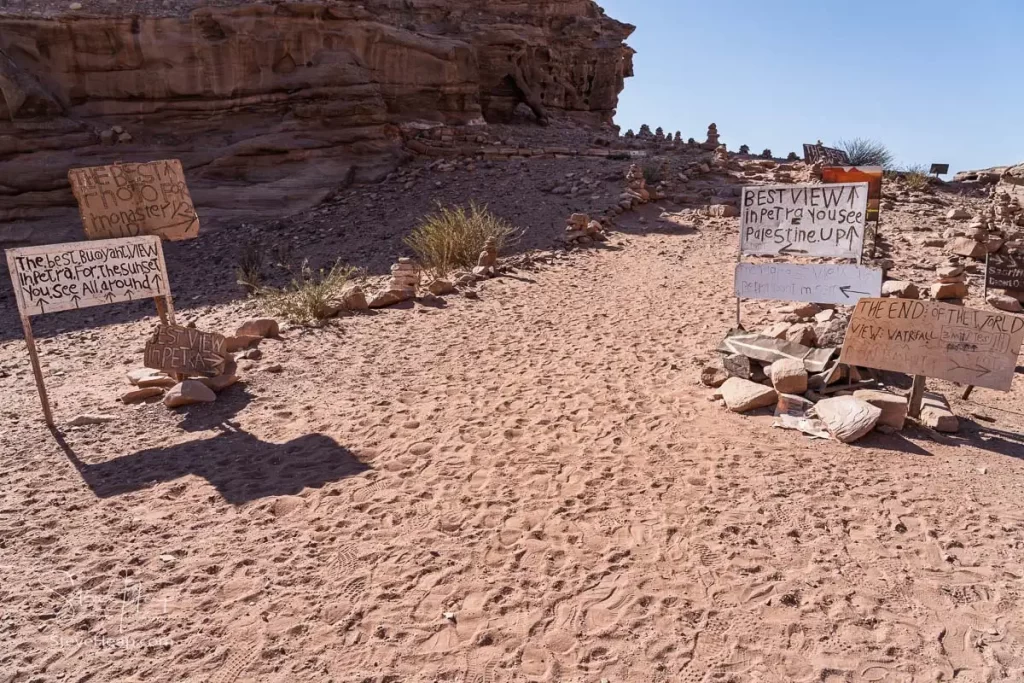
We chose one more or less at random and it had the usual shop (with no sign of the owner) and a nicely constructed overlook for the very barren and rocky slopes on the far side of this mountain.
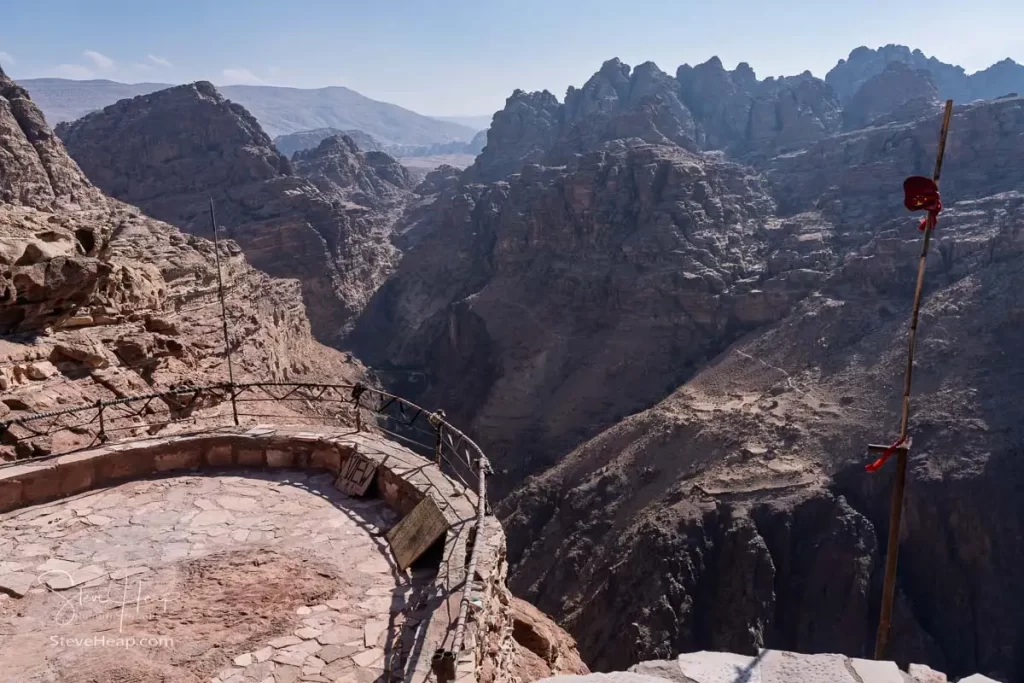
And close by, you can actually see past the mountain ranges to the desert and, on a clearer day, across the Dead Sea.
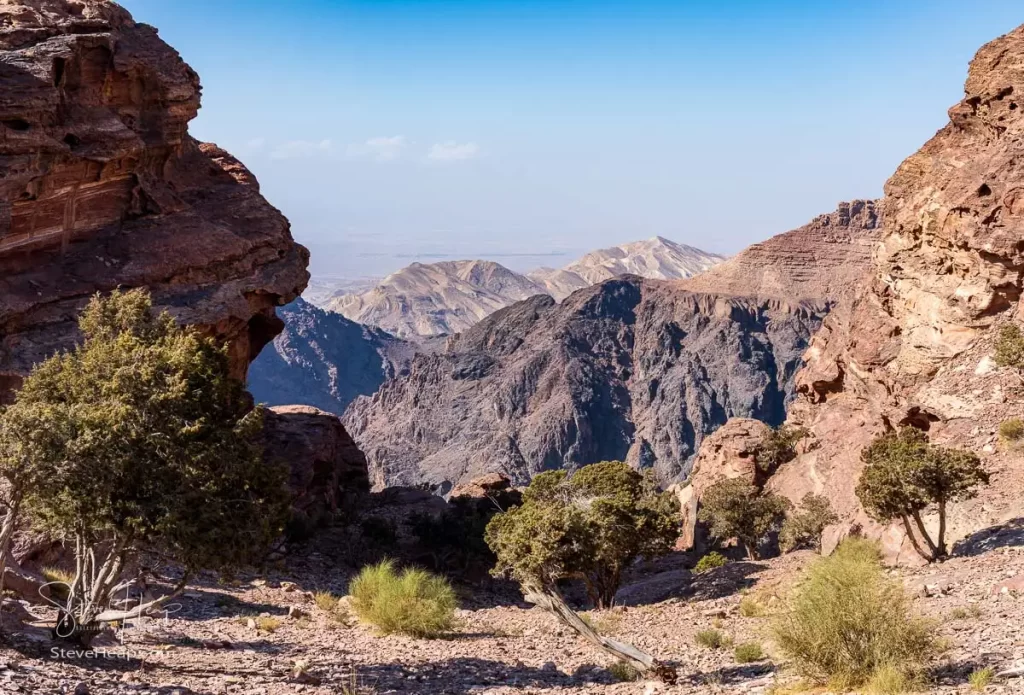
From here, it is downhill all the way. Somewhat easier, although it does exercise different muscles! We walked down to the main section of Petra and headed off to find these shuttles, finding each step just a bit harder than the one before as the Shuttle stop is up a hill. We did find a nicely constructed shuttle stop after a little walk with seats and shade and a pleasant place to wait for the next bus, but, at least when we went there, the shuttles didn’t actually come here! They stop on a sandy parking area about 1/2 mile (or more) up this road. So, we trudged along the road until at last we saw the shuttle buses. At least there was one there!
Thinking that at last we had made it, the shuttle took a strange route back to the town and turned into a newly constructed Cultural Village with wooden shops and locals offering clothing and souvenirs. This is a compulsory stop and a compulsory exit from the shuttle for 15 minutes. In effect, you are forced to find somewhere in the shade to stand until you are given permission to get back on the bus. Can you imagine that they do much trade here? The people on our shuttle were furious with being made to get out when all they wanted was to get back to the hotel and maybe lay in the bath! No tips for our driver either.
And so that it is it. You are dropped off by the entrance to Petra and it is a short stroll to the hotel and a welcome beer or two!
That evening, there is no included dinner. Some people went out to a bar/restaurant on the hillside called the Cave (I think) that is actually built into the mountainside. Good reports from them. We bought the buffet dinner in the hotel and had an early night!
The next day was again a reasonable start to reboard the coaches to make our way north, past Amman to a spectacular roman city. More to come!
